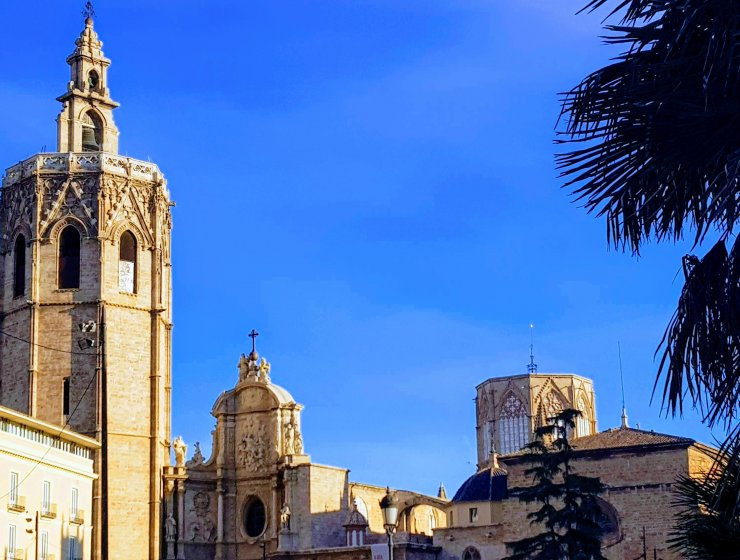
-Index-
Preface
Saints, Painters, Nuns and (Linguistic) Politics. Aspects of Politics and Forbidden Delights in Valencia
Antonio CORTIJO; Vicent MARTINES
Original title: Sants, pintors, monges i política (Lingüística). Aspectes de política i delits prohibits a València
Articles
Textual transmission in Latin and romance language of the sermons of Sant Vicent Ferrer
Manuel ORTUÑO ARREGUI
Original title: La transmisión textual en lengua latina y romance de los sermones de Sant Vicent Ferrer
Keywords: Latin, Romance, Sermons, St. Vincent Ferrer.
The aim of the present article is to explain the textual transmission in Latin and romance language of the sermons preached by S. Vicent Ferrer. His sermons were scored by listeners who were transcribing them and are notable texts in Valencian, Catalan and Castilian medieval literature. In fact, the oldest Vincentian sermons that have come down to us are in latin – which is not to say that he might preach in that language but for its wider dissemination and usefulness were collected in it–, while it is accurate that in some few occasions have some words in other languages, probably introduced by the same reportatores.
The correspondence between the jurats of Valencia and St. Vincent Ferrer during the Aragon’s interregnum (1410-1412)
Guillem CHISMOL
Original title: La relació epistolar dels jurats de València amb Sant Vicent Ferrer al voltant de l’Interregne (1410-1412)
Keywords: Interregnum, Jurats of Valencia, Medieval communication, Medieval letters, Vicent Ferrer.
The investigation investigates epistolary relationships between two of the most important Valencian actors of the Caspe Commitment era, the juries of Valencia and Vicente Ferrer. It is also a study on medieval semi-public communication since one of the actors in the communication, the issuer is a public institution and the other, the receiver, is a particular physical person. However, the present work does not stop at mere communication and aims to show the political role played by the juries and the saint throughout the Interregnum and how their relationship changes depending on their political position on who they defend as the legitimate king of the Crown of Aragon.
Sentences and obligations of Valencian painters (1390-1450)
Francesc GRANELL SALES
Original title: Condemnes i obligacions dels pintors de València (1390-1450)
Keywords: Kingdom of Valencia, Medieval Justice, Medieval Painting, Social History.
This paper shows a first approach to the social history of painters of València by means of a particular source: the Justícia de 300 sous records and specially those included in the books Condempnacions i Obligacions.
The delights prohibited at the woman’s monastery
Francisco José CONEJERO PASCUAL
Original title: Els delits prohibits als cenobis femenins
Keywords: Feminine monastery, Literary cultural practice, Misdemeanour, Modern Age, Moral.
The present investigation pretends to do visible the importance of the monastery feminine, at the ken of the life and the culture of the women of the 16th century. This period met how the Modern Age has not enjoyed for part of the Catalan literary canon a positive consideration, since the term Decadence has comported a pejorative vision of the praxiliterary realized by the women. At this sense, the delights of the women that inhabited these cloisters evidence us that it is necessary to delete commonplaces of the life monastery feminine that are very moved away of the reality. Among the most excelled delights of these excels the reading and the sex that manifested an optics of the different reality of what pretended to impose the ecclesiastical patriarchy.
The fragilities of friar Pere Bolluga
Albert TOLDRÀ I VILARDELL
Original title: Les fragilitats de fra Pere Bolulla
Keywords: History of Church, History of sexuality, History of women, Inquisition, Sexual sollicitatio in confession.
Sexual sollicitatio in confession is a great sin, where the priest –usually a monk, and often Franciscan– does sexual actions, words or propositions to the penitent, man or woman. It’s serious because supposes an sacrilegious use of the sacrament of penitence, and is so assimilated to heresy, and is then competency of Inquisition, who will use this power like a control instrument over priests, secular and monasterial. In this communication we will see a late case, that of Capuchin monk fr. Pere Bolulla, who acts in Xàtiva, Benidorm and Callosa d’en Sarrià.
Linguistic ideologies in the periodical publications of the Valencian Country (1854-1906)
Adrià MARTÍ-BADIA
Original title: Les ideologies lingüístiques de les publicacions periòdiques valencianes (1854-1906)
Keywords: Linguistic ideologies, Llemosinisme, Periodical publications, Romance philology, Valencian Country.
This paper analyzes the articles, published between the years 1854 and 1906 in Valencian periodical publications, which refer to the origin, identity and name of the Catalan language, in order to determine the linguistic ideology of the publications. It focuses on the articles signed by the director or the journalists, as well as those which are anonymous. It is understood that, as a whole, these articles express the linguistic ideology of the publications and their promoters.






















































































